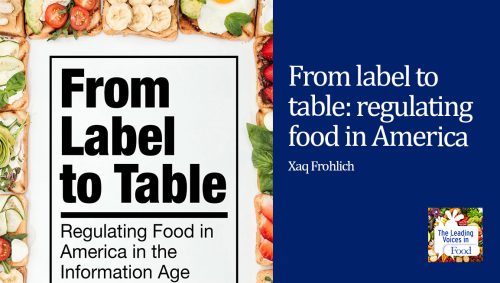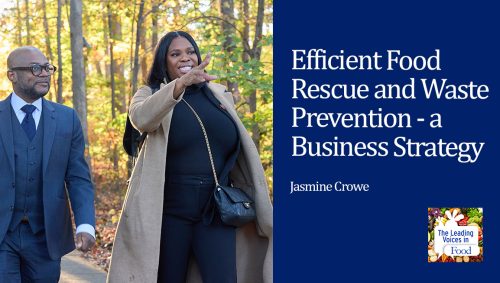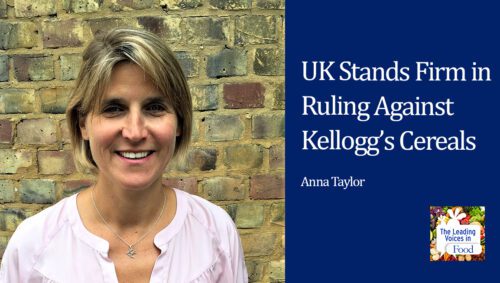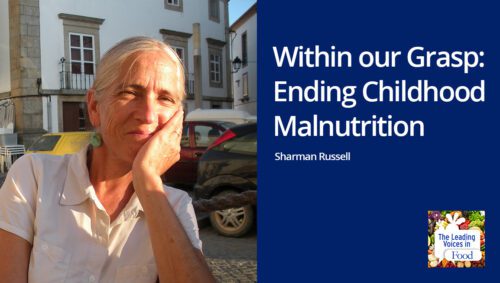The Leading Voices in Food
E33: Food Defense and the Extreme Complexity of our Food Supply Chain
In another podcast called Food Defense 101, Amy Kircher, director of the Food Protection and Defense Institute at the University of Minnesota, painted a picture of threats the nation faces with intentional contamination of the food supply. A very important part of her work is what to do about this threat.
Subscribe: Apple Podcasts | TuneIN | Google Podcasts | SoundCloud | PocketCasts | Radio Public
Tags: Food Safety & Food Defense | International Food & Ag Policy |

Amy Kircher is the Director of the Food Protection and Defense Institute, a Department of Homeland Security Center of Excellence and Co-Director of the Collaboratory at the University of Minnesota. She leads the Institute’s initiatives and coordinates a research consortium of experts dedicated to protecting the food system through research and education. Her current research includes identification and warning of food disruptions and emerging disease through data fusion and analysis; supply chains; and delivery of innovative solutions to the professionals in the field. Additionally, she conducts research efforts on global health and pandemic preparedness leveraging expertise and technology that exists in the Institute.
Interview Summary
How is food defense being addressed by the food companies? Because of course, they’re highly vulnerable to scandals and lawsuits and other things that could happen if their food was intentionally contaminated?
You’re absolutely correct. And it is a real challenge for food companies. At their core, they make food for consumers to buy. And so the thought of someone intentionally adulterating their product is not something that has been sort of front of mind. Recently, the Food Safety Modernization Act (FMSA) introduced several new rules. The seventh of those rules is on intentional adulteration or food defense. So companies now have to look at food defense from the perspective of how do they mitigate any threats to the foods they produce. So they’ve started to spend more time in this arena because of that FSMA rule.
Let’s take Unilever, Nestle, Kraft or a Cargill, any of them, and give us a sense of the number of products such a company might sell and how many constituent things might be going into those products? Are we talking about hundreds, thousands, many more? What do the numbers of like?
If we talk about some of these global footprint companies, we’re talking thousands of different SKUs (SKU stands for stock keeping units). Each of those food products has multitudes of ingredients that make up a final product. And on top of that, the companies probably have multiple vendors that they source from. So if they sourced a particular product from one area today, they may source it from another area or a different company the next day. So the complication of how we’ve constructed our food supply is incredible and global, and it is a very complex network of interconnected systems that have to all work together to create a product that we can buy off the grocery shelves. It is really challenging for a food company to understand all of that complexity because they need to know all of the suppliers behind them. Typically a food company has known who they’ve sourced from–one back–and who they sell to–one forward–in this new rule. And when we think about protecting the food from intentional adulteration, they need to be able to understand their whole supply chain for all ingredients.
I imagine that given the complexity of the supply chain, and the number of players that the food companies are getting their constituent ingredients from, it would be impossible to test for safety and all those ingredients. So do they just have to trust their suppliers?
Certainly. So when we think about it from food safety perspectives, for instance, there are certificates of authenticity. There are contracts about maybe purity of an ingredient or the spec of the ingredient that’s purchased That really does help with food safety. But if we think about food defense and someone intentionally adulterating a raw material or an ingredient, they don’t care about that certificate or purity. They will forge, perhaps, those documents to ensure that their product is purchased. So from a food safety perspective, of course, it helps to have those good processes in place, whether they’re policy or manufacturing. But when we think about food defense and someone being an intelligent adversary, well they will be fraudulent in the production of documentation or representation of their material because they’re trying to do harm in the system.
So let’s go back to the particular food that you mentioned in the first podcast that we recorded: Worcestershire sauce. And you said it could have as many as 11 different players who might be involved in supplying to the final company, different ingredients. Do the ingredients get tested anywhere along the line or do the final products get tested? Or is it just kind of a matter of faith that everything is going to be safe?
That’s a great question, Kelly. And so I would argue for all of the ingredients within that bottle of Worcestershire sauce, each of them has a long supply chain. Paprika itself might have 11 steps. So multiply that by the number of ingredients that happen to be in that particular bottle you’ve purchased. So for each particular ingredient, there might be a set of tests that happen because it’s good practice or because there’s been an issue in the past. So perhaps they’re testing for purity or for safety reasons. But there isn’t a standard way to test all ingredients. So I think that’s challenge one. And as food moves throughout the world where we source these ingredients from, until it gets to final product may span multiple countries. We also don’t have a standard system globally for testing each of these particular products. This just adds to the complexity of protecting the food supply.
What’s the role of government in all this?
So there are multiple roles, I would argue, in this space. One is that we need to set up good guidance of how we look at vulnerability and then prepare against that. So that good guidance comes out of, at least in the United States, may come out of Congress and then rules are implemented by our departments about how to build a framework and structure a program to make sure that we understand vulnerabilities and food and how to protect against it. The other role in government, in food defense, in particular, is that of intelligence or knowledge gathering. Where do we have disruptions in the system where somebody may be wanting to do harm? So is there information about a particular group that wants to do harm on another entity, either a company, a brand, a particular sector, maybe like agriculture, production, animal agriculture perhaps? And then is there an avenue for them to execute in that area? So when we talk about food defense, it’s not just the traditional food regulation departments that are in our government, but it also is those security and intelligence and law enforcement elements. Intentional contamination of food is a crime. And when it’s a crime, we need to ensure that law enforcement is an active partner.
One could imagine a lot of different government agencies having an interest in this. The Department of Homeland Security obviously, and your center is affiliated with that department. The Defense Department, the US Department of Agriculture, the Food and Drug Administration, and there are more. Where does authority lie on this and is there a lead player? How do these organizations work together–these parts of government?
So personally I think this is a significant challenge we face. There is not a lead player for food defense. As you’ve already mentioned, there are several departments and agencies within the government that own a piece of this puzzle. And unfortunately, there’s not one group that’s been knighted as the lead. This creates a significant challenge in unifying the effort. Now have we overcome that? To some extent? Yes, we do it through working groups. We do it with relationships between entities and organizations that may either regulate food or regulate investigation of food or do protection of the homeland. So there are groups that come together that attempt to tackle food defense, but I would argue there is no lead or central policy for food defense, making it really challenging from a consistency, a perspective to get the work done. I think what we see is inconsistency in roles, duplication of effort, and often gaps in food defense.
If there are challenges organizing and harmonizing things just in the US, you can imagine how that would be even more complex on a global level. And given that the food system is so global, how, how are things being coordinated around the world?
So food safety has done a great job of harmonizing the globe around what does it mean to have safe food and how do we protect our food supply. Food defense has not culminated in that global harmonization yet. We see individual countries, sometimes regions coming together to start to tackle food defense, but yet we’re inconsistent in how we’re doing it. What we see is it’s often that any effort has been motivated by some attack. So in New Zealand, they had a sabotage incident which motivated them to start building food defense programs. In the UK we saw the horsemeat scandal, and that was very much a food fraud issue. So their motivation is around food fraud. In parts of Africa, they culminate all of this work under food safety. So you can see where the lack of standardization becomes a significant challenge in that our food, our global plate at dinner, comes from around the world and may not have had the same food defense programs for each of the things that we’re eating.
If our listeners wanted to learn more about this topic, where would you suggest to go?
There are a couple of interesting places that I think you could go to. Certainly, there are research and academic publications on food defense and how to protect the food system. So you can come to our website at Food Protection and Defense Institute. You can certainly look at our government programs, both the FDA and the USDA has food defense websites. You can read more about policy and program implementation. I also would say there is some popular press and maybe we would call it entertainment opportunities to learn more about it as well. Netflix has produced a series called rotten that talks about food fraud, for instance.






